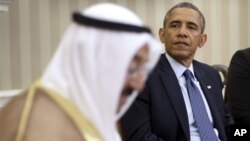WHITE HOUSE —
President Barack Obama has repeated that any diplomatic solution to the Syrian chemical weapons issue must be verifiable and enforceable. He spoke after talks Friday with the emir of Kuwait, Sheik al Ahmad Jaber al-Sabah, which also covered Egypt's political and economic crisis and other issues.
Kuwait is an important non-NATO regional ally of the United States, and a key member of the Gulf Cooperation Council, which works closely with Washington on regional political and security issues.
With Saudi Arabia, Qatar and the United Arab Emirates, Kuwait supported a joint statement, issued on the margins of this month's G20 summit in St. Petersburg, Russia, condemning the August chemical attack in Syria.
The president said Syria was at the top of the list of items during the talks with the Kuwaiti leader.
"Our two countries are in agreement that the use of chemical weapons that we saw in Syria was a criminal act, and that it is absolutely important for the international community to respond not only in deterring repeated use of chemical weapons but hopefully getting those chemical weapons outside of Syria," said Obama.
Obama said he hopes U.S.-Russian negotiations that now are taking place "bear fruit," and he repeated that any diplomatic solution must be verifiable and enforceable.
"We agreed that ultimately what is needed for the underlying conflict is a political settlement that allows ordinary Syrians to get back to their homes, to rebuild and to relieve the enormous suffering that is taking place."
Sheik al-Sabah spoke through a translator. "We also discussed the harsh humanitarian suffering of the Syrian people and the continuation of the ongoing humanitarian deterioration in Syria and suffering of the refugees, and the importance of interlacing all efforts in a speedy manner to reach a peaceful solution and keep the region free from danger of war," he said.
The talks also covered the political and economic crisis in Egypt - what the Kuwaiti leader called "the importance of achieving security and stability in Egypt and constructive efforts "on this road map."
Kuwait is a major source of financial support for Egypt, where unrest continues in the wake of the July military coup that toppled Islamist president Mohamed Morsi. Egypt's government continues to press a crackdown on the Muslim Brotherhood.
Kuwait announced in July it would provide $4 billion to Egypt, including a $2-billion deposit into the Egyptian central bank - aid that has helped Egypt in negotiations with the International Monetary Fund.
Other issues included Kuwait's relations with Iraq, security in the Gulf, and another issue of particular importance to Kuwait.
"We also discussed the continued detention of the two Kuwaiti detainees at Guantanamo and asked President Obama to speed up the process of releasing them, in line with the president's commitment of closing down Guantanamo and also in line with the assurances given by the Kuwaiti authorities," said Sabah.
It was the second White House meeting between the president and the Kuwaiti emir. Their talks in 2009 covered Iran, Afghanistan, Israeli-Palestinian peace efforts and Kuwait's support for U.S. forces still in Iraq at the time.
Kuwait is an important non-NATO regional ally of the United States, and a key member of the Gulf Cooperation Council, which works closely with Washington on regional political and security issues.
With Saudi Arabia, Qatar and the United Arab Emirates, Kuwait supported a joint statement, issued on the margins of this month's G20 summit in St. Petersburg, Russia, condemning the August chemical attack in Syria.
The president said Syria was at the top of the list of items during the talks with the Kuwaiti leader.
"Our two countries are in agreement that the use of chemical weapons that we saw in Syria was a criminal act, and that it is absolutely important for the international community to respond not only in deterring repeated use of chemical weapons but hopefully getting those chemical weapons outside of Syria," said Obama.
Loading...
Obama said he hopes U.S.-Russian negotiations that now are taking place "bear fruit," and he repeated that any diplomatic solution must be verifiable and enforceable.
"We agreed that ultimately what is needed for the underlying conflict is a political settlement that allows ordinary Syrians to get back to their homes, to rebuild and to relieve the enormous suffering that is taking place."
Sheik al-Sabah spoke through a translator. "We also discussed the harsh humanitarian suffering of the Syrian people and the continuation of the ongoing humanitarian deterioration in Syria and suffering of the refugees, and the importance of interlacing all efforts in a speedy manner to reach a peaceful solution and keep the region free from danger of war," he said.
The talks also covered the political and economic crisis in Egypt - what the Kuwaiti leader called "the importance of achieving security and stability in Egypt and constructive efforts "on this road map."
Kuwait is a major source of financial support for Egypt, where unrest continues in the wake of the July military coup that toppled Islamist president Mohamed Morsi. Egypt's government continues to press a crackdown on the Muslim Brotherhood.
Kuwait announced in July it would provide $4 billion to Egypt, including a $2-billion deposit into the Egyptian central bank - aid that has helped Egypt in negotiations with the International Monetary Fund.
Other issues included Kuwait's relations with Iraq, security in the Gulf, and another issue of particular importance to Kuwait.
"We also discussed the continued detention of the two Kuwaiti detainees at Guantanamo and asked President Obama to speed up the process of releasing them, in line with the president's commitment of closing down Guantanamo and also in line with the assurances given by the Kuwaiti authorities," said Sabah.
It was the second White House meeting between the president and the Kuwaiti emir. Their talks in 2009 covered Iran, Afghanistan, Israeli-Palestinian peace efforts and Kuwait's support for U.S. forces still in Iraq at the time.






